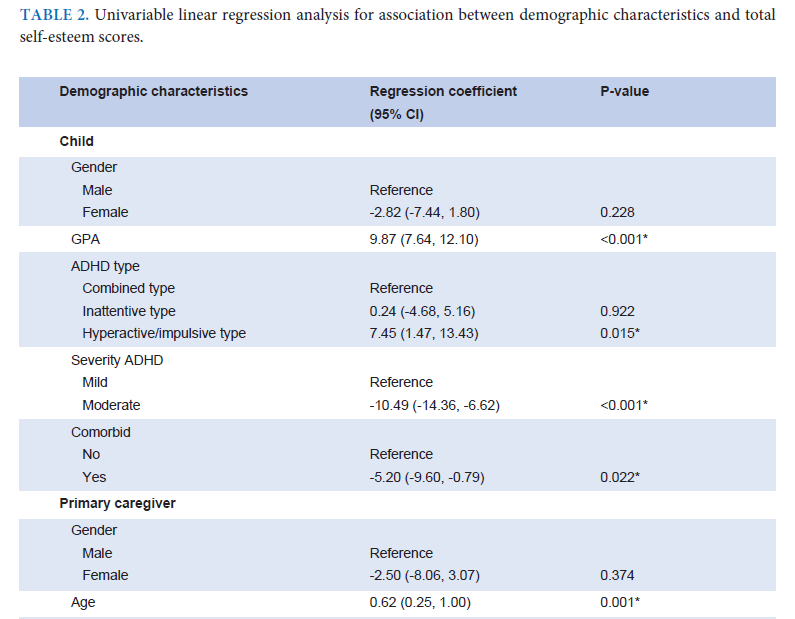The Relationship Between Primary Caregivers’ Psychosocial Factors and Self Esteem in Children and Adolescents with ADHD: An Exploratory Crosssectional Study
DOI:
https://doi.org/10.33192/smj.v75i8.263447Keywords:
attention-deficit/hyperactivity disorder, self-esteem, caregiver, psychosocial factor, depressionAbstract
Objective: This study examined the correlation between primary caregivers’ psychosocial factors and self-esteem in children and adolescents with attention-deficit/hyperactivity disorder (ADHD).
Materials and Methods: A cross-sectional study involving primary caregivers and their children with ADHD, aged 8-15, was conducted from September 2022 to February 2023. The children’s self-esteem was assessed using the Five-Scale Test of Self-Esteem for Children. Primary caregivers’ psychosocial factors were assessed using the Attitude of Parenting Questionnaire, Parenting Style and Dimension Questionnaire, Patient Health Questionnaire-9, and Generalized Anxiety Disorder 7-item. Descriptive statistics and multivariable linear regression were used to determine the associations among variables.
Results: The study included 66 pairs of children and adolescents with ADHD and their primary caregivers. The study found 53% of caregivers screened positive for depression, while 16.7% screened positive for anxiety. Almost all caregivers (90.9%) adopted an authoritative parenting. The mean self-esteem score in participants with ADHD was 39.23±8.99. Younger caregivers, those with an education level below a bachelor’s degree, higher monthly income, positive screening for depression, and lower attitudes toward parenting scores were significantly associated with low self-esteem scores in their children.
Conclusion: Age, education level of caregivers, and monthly family income were significantly correlated with the self-esteem of children and adolescents with ADHD. The attitudes of caregivers towards parenting and depression in caregivers also impacted self-esteem of children with ADHD under their care. Thus, strategies aimed at promoting positive caregiving attitudes, regular screening of caregivers for depression, and providing appropriate treatment are recommended to enhance self-esteem in children and adolescents with ADHD.
References
Thomas R, Sanders S, Doust J, Beller E, Glasziou P. Prevalence of attention-deficit/hyperactivity disorder: a systematic review and meta-analysis. Pediatrics. 2015;135(4):e994-1001.
American Psychiatric Association: Diagnostic and Statistical Manual of Mental Disorders, Fifth Edition: DSM-5. Washington, DC: American Psychiatric Association; 2013.
Houck G, Kendall J, Miller A, Morrell P, Wiebe G. Self-concept in children and adolescents with attention deficit hyperactivity disorder. J Pediatr Nurs. 2011;26(3):239-47.
Mazzone L, Postorino V, Reale L, Guarnera M, Mannino V, Armando M, et al. Self-esteem evaluation in children and adolescents suffering from ADHD. Clin Pract Epidemiol Ment Health. 2013;9:96-102.
Glass K, Flory K, Martin A, Hankin BL. ADHD and comorbid conduct problems among adolescents: associations with self-esteem and substance use. Atten Defic Hyperact Disord. 2011;3(1):29-39.
Dumas D, Pelletier L. A study of self-perception in hyperactive children. MCN Am J Matern Child Nurs. 1999;24(1):12-9.
Slomkowski C, Klein RG, Mannuzza S. Is self-esteem an important outcome in hyperactive children? J Abnorm Child Psychol. 1995;23(3):303-15.
Treuting JJ, Hinshaw SP. Depression and self-esteem in boys with attention-deficit/hyperactivity disorder: associations with comorbid aggression and explanatory attributional mechanisms. J Abnorm Child Psychol. 2001;29(1):23-39.
Barber S, Grubbs L, Cottrell B. Self-perception in children with attention deficit/hyperactivity disorder. J Pediatr Nurs. 2005;20(4):235-45.
Lerdpaisanskul M, Boonchooduang N, Charnsil C, Louthrenoo O. Self-esteem in children with attention-deficit/hyperactivity disorder. Chiang Mai Med J 2017;56(1):1-7.
Cochran W. Sampling techniques. 3rd ed. New York: John Wiley & Sons; 1986.
Putthisri S, Silpakit C. The Five-Scale Test of Self-Esteem, Thai Version. J Psychiatr Assoc Thailand. 1998;43(4):358-67.
Piyawattanametha S, Chaiudomsom K, Patjanasoontorn N, Piyavhatkul N. Association between Maternal Attitudes of Child Care and Self-esteem in Children and Adolescents with Learning Disorders at Srinagarind Hospital. J Psychiatr Assoc Thailand. 2020;65(3):233-44.
Detnakarintra K, Trairatvorakul P, Pruksananonda C, Chonchaiya W. Positive mother-child interactions and parenting styles were associated with lower screen time in early childhood. Acta Paediatr. 2020;109(4):817-26.
Baumrind D. Authoritarian vs. authoritative parental control. Adolescence. 1968;3(11):255-72.
Lotrakul M, Sumrithe S, Saipanish R. Reliability and validity of the Thai version of the PHQ-9. BMC Psychiatry. 2008;8:46.
Spitzer RL, Kroenke K, Williams JB, Lowe B. A brief measure for assessing generalized anxiety disorder: the GAD-7. Arch Intern Med. 2006;166(10):1092-7.
Khaleque A. Perceived Parental Warmth, and Children’s Psychological Adjustment, and Personality Dispositions: A Meta-analysis. J Child Fam Stud. 2013;22:267-306.
Krauss S, Orth U, Robins RW. Family environment and self-esteem development: A longitudinal study from age 10 to 16. J Pers Soc Psychol. 2020;119(2):457-78.
Bergen SE, Gardner CO, Kendler KS. Age-related changes in heritability of behavioral phenotypes over adolescence and young adulthood: a meta-analysis. Twin Res Hum Genet. 2007;10(3):423-33.
Jendreizik LT, von Wirth E, Dopfner M. Familial Factors Associated With Symptom Severity in Children and Adolescents With ADHD: A Meta-Analysis and Supplemental Review. J Atten Disord. 2023;27(2):124-44.
Parker JS, Benson MJ. Parent-adolescent relations and adolescent functioning: self-esteem, substance abuse, and delinquency. Adolescence. 2004;39(155):519-30.
Flouri E. Parental interest in children's education, children's self-esteem and locus of control, and later educational attainment: twenty-six year follow-up of the 1970 British Birth Cohort. Br J Educ Psychol. 2006;76(Pt 1):41-55.
Conger RD, Donnellan MB. An interactionist perspective on the socioeconomic context of human development. Annu Rev Psychol. 2007;58:175-99.
Luthar SS, Latendresse SJ. Children of the Affluent: Challenges to Well-Being. Curr Dir Psychol Sci. 2005;14(1):49-53.

Published
How to Cite
License
Copyright (c) 2023 Siriraj Medical Journal

This work is licensed under a Creative Commons Attribution-NonCommercial-NoDerivatives 4.0 International License.
Authors who publish with this journal agree to the following conditions:
Copyright Transfer
In submitting a manuscript, the authors acknowledge that the work will become the copyrighted property of Siriraj Medical Journal upon publication.
License
Articles are licensed under a Creative Commons Attribution-NonCommercial-NoDerivatives 4.0 International License (CC BY-NC-ND 4.0). This license allows for the sharing of the work for non-commercial purposes with proper attribution to the authors and the journal. However, it does not permit modifications or the creation of derivative works.
Sharing and Access
Authors are encouraged to share their article on their personal or institutional websites and through other non-commercial platforms. Doing so can increase readership and citations.














